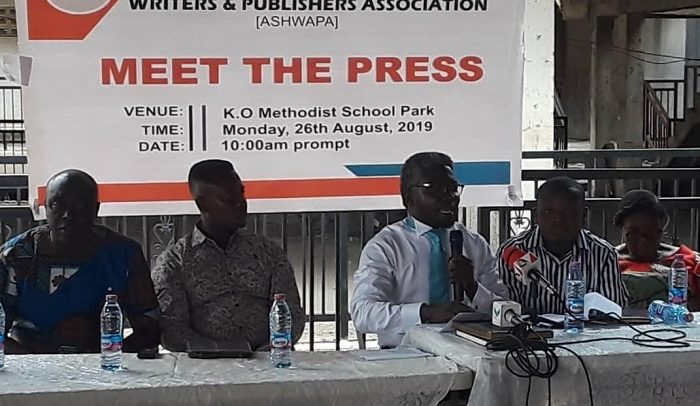Executives of the association at the media briefing
Members of the Ashanti Region Writers and Publishers Association (ASHWAPA) have appealed passionately to the government to defer the implementation of the new Ghana Education Service (GES) submission guideline until the next academic year to enable them to prepare adequately for it.
According to them, the implementation of the regulatory tweak, which is being introduced as part of the new education curriculum commencing 2019/2020 in line with the ongoing reforms in the sector, would hurt their businesses as they have in stock books for sale for this academic year.
Addressing the media in Kumasi, ASHWAPA’s Secretary, James Offeh Ford, said members of the association would be driven out of business if the implementation is done for the 2019/2020 academic year.
He stated that the National Council for Curriculum Assessment (NaCCA) delayed in releasing the new guideline for submission of books for assessment when the new curriculum was launched by GES in April this year, hence the call for extension.
He wants the implementation to start in the next academic year for them not to incur losses and ensure fairness and effective competition in the book market.
Mr. Offeh Ford also wants government to review downwards the cost for submitting a book by authors and publishers for assessment and approval in the new arrangement.
He claimed the new guideline had pegged the cost of submitting six sets of a 200-page book at GH¢7,800 per author, pointing out that the new policy would undoubtedly stifle their businesses, which would eventually lead to job losses in the publishing industry.
“It means that if you have three sets of books you will have to pay GH¢2,300. These new costs will strangle our businesses and kill jobs in the industry,” Mr. Offeh Ford stressed.
The secretary appealed to the Ministry of Education to prevail on GES to allow them to sell their current stocks of books, which he said were prepared in accordance with the new curriculum, so as to mitigate their loses.
“Schools are resuming and if books are not available on the market, it would adversely affect academic work, and Ghanaian children will be at the receiving end,” Mr. Offeh argued.
The association was equally not happy about a decision by NaCCA to introduce a short code that would be used by the public to authenticate GES approved textbooks, describing the move as unnecessary.
For him, if publishers of foreign textbooks are allowed to sell without going through the rigorous assessment of the GES, such code would only create additional bureaucracy that would serve as a conduit for some people to take money from authors and publishers.
He prayed for government’s intervention in all these to save their businesses from collapsing, which he believes would also hurt the national economy.
From Ernest Kofi Adu, Kumasi


